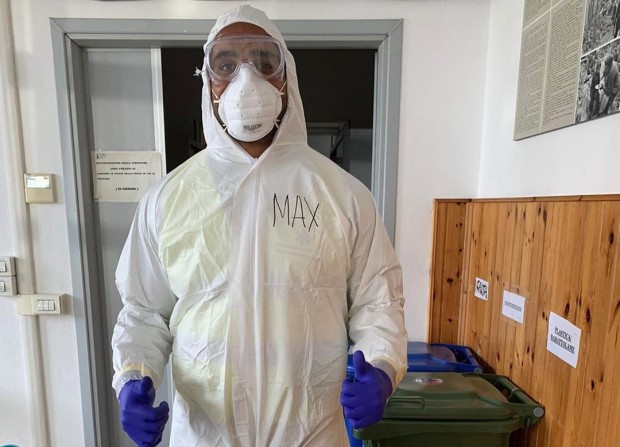French referee Thomas Charabas, Italian Test player Maxime Mbanda and Springbok Women’s vice-captain Zinhle Ndawonde have described life on the frontline in the fight against the global coronavirus pandemic.
Like it has done to so many of other industries, Covid-19 has brought sport around the world to a halt. But while athletes the world over are finding creative ways to stay fit while either in self-isolation, quarantine or lockdown, this trio are working long-hour shifts in the emergency services.
Charabas, a Top 14 referee, is working as a full-time emergency room doctor in Bayonne and says due to the deadly nature of the coronavirus he has not given the sport much thought in recent weeks.
‘In Bayonne, the flow of patients is controlled. We were fortunate not to have a “cluster”… but every day we have more and more consultations for respiratory reasons.
‘We don’t think about it [fear the virus]. As far as I’m concerned, I’m young, but I understand that some of my older colleagues can ask questions, knowing that the first deaths have been observed among the nursing staff.
‘We try to be careful when dressing and undressing, to wash regularly, to respect the barrier gestures to the letter. When the slightest sign appears, you should get tested. But if we, doctors, start to be afraid, we will not get out …
‘Unfortunately we can’t predict, and I have no information about it … all I can tell you is that if the season resumes, I will be the happiest because that will mean that we won our fight.’
Meanwhile in Italy, the epicentre of the global health crisis, Azzurri flank Mbanda is working 13-hour shifts as an ambulance driver.
‘When everything was cancelled in rugby, I wondered how I could help, even without medical expertise. I started eight days ago, without a day’s break and with shifts of 12 or 13 hours,’ he said.
‘But faced with what I see in the infectious disease rooms, I tell myself that I can’t be tired. Fear is normal. But there are little things that can be done safely that would give those on the front lines a half hour or an hour’s rest. For them, an hour is crucial.
‘As long as I’m strong, I’ll keep going. I’m here and I’m staying here. I found the Yellow Cross, which had a transport service for medicine and food for the elderly. I found myself transferring positive patients from one local hospital to another. I help with the stretcher or if there are patients to be carried from a wheelchair. I also hold the oxygen.
‘If people saw what I see in the hospitals, there wouldn’t be a queue in front of the supermarkets anymore. They would think two, three or four times before leaving home, even to go running. What I see are people of all ages, on respirators, on oxygen. Doctors and nurses on 20- or 22-hour shifts, not sleeping one minute of the day and just trying to get some rest the next day.’
In South Africa, Ndawonde is working as a firefighter at King Shaka International Airport and has urged fellow South Africans to adhere to the measures and restrictions put in place by the government.
PROTECT YOU TO PROTECT US
together we can fight this pandemic.@CoronaVirusZA_ @covid19safety @kingshakaint #iscisha pic.twitter.com/CS7dRnFrsF— Zinhle (@zinhlendawonde) March 24, 2020





